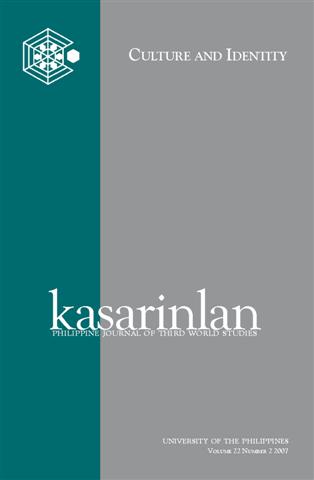Imagining the Terrorist: Racialization of Asian Identities since 9/11
Abstract
This paper argues that the emergence of the “new terrorism” discourse since 9/11 reconfigures the conventional categories of race and space by conflating “terrorism” with a host of Asian identities. Although the Middle East has become practically synonymous with “terrorism” since 9/11, the US-led global “war on terror” has strategically demarcated all the Islamic-led political dissents throughout Asia as potentially “terrorist” and volatile, thus depicting the region as a fearsome terrain, filled with dangerous and irrationally religious people who threaten civilization with deadly chaos. Indeed, it is only symbolic of the new racialization of Asia that recent studies on terrorism present an inordinate amount of “evidence” to draw linkages between the Islamist groups in Bangladesh, Sri Lanka, Pakistan, Indonesia, India, Malaysia, and Thailand, and the al-Qaeda terrorist network. While these are recent developments, the ideologies underpinning the new racialization of Asia have complex genealogies and discursive contexts. In an attempt to uncover these discursive contexts, this paper contends that the emergence of anthropology as a colonial science has been central to the indoctrination of the cultural-other, while geography has become an imperialist discourse in transforming the cultural-other into spatial categories. Although these discursive contexts continue to shape the otherization of Asian identity, they are being selectively deployed by the newfound discourses of “area studies,” “security studies,” and “terrorology” in the racialization of Asian identities since 9/11.
Published
2008-01-03
How to Cite
KUMAR, Malreddy Pavan.
Imagining the Terrorist: Racialization of Asian Identities since 9/11.
Kasarinlan: Philippine Journal of Third World Studies, [S.l.], v. 22, n. 2, p. 4-21, jan. 2008.
ISSN 2012-080X.
Available at: <https://journals.upd.edu.ph/index.php/kasarinlan/article/view/692>. Date accessed: 29 aug. 2025.
Section
Articles
Keywords
Orientalism; literature; ethno-terrorism; geography; space; territorial mapping; Asia; area studies; anthropology; anthropometry
By submitting a manuscript, the authors agree that the exclusive rights to reproduce and distribute the article have been given to the Third World Studies Center.



